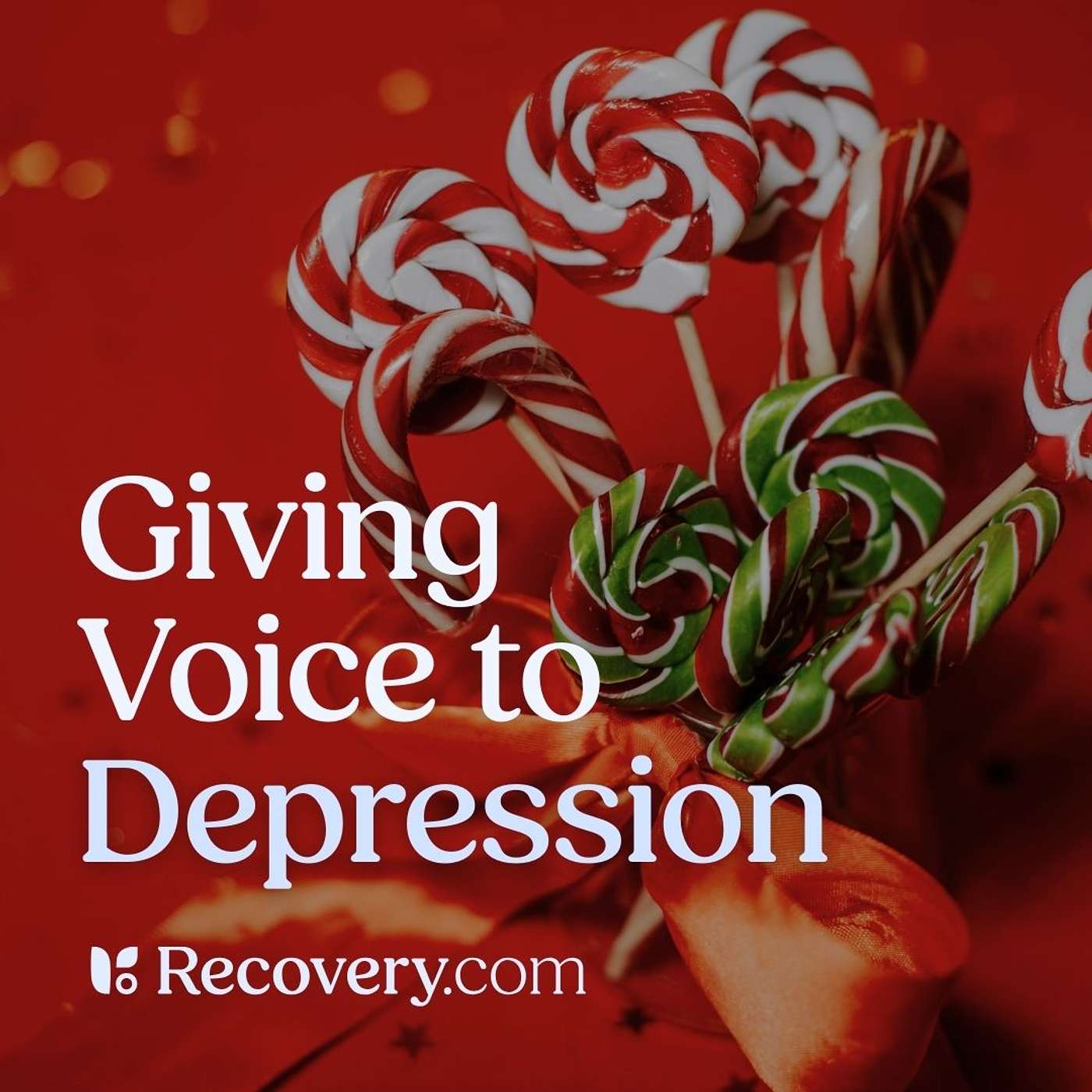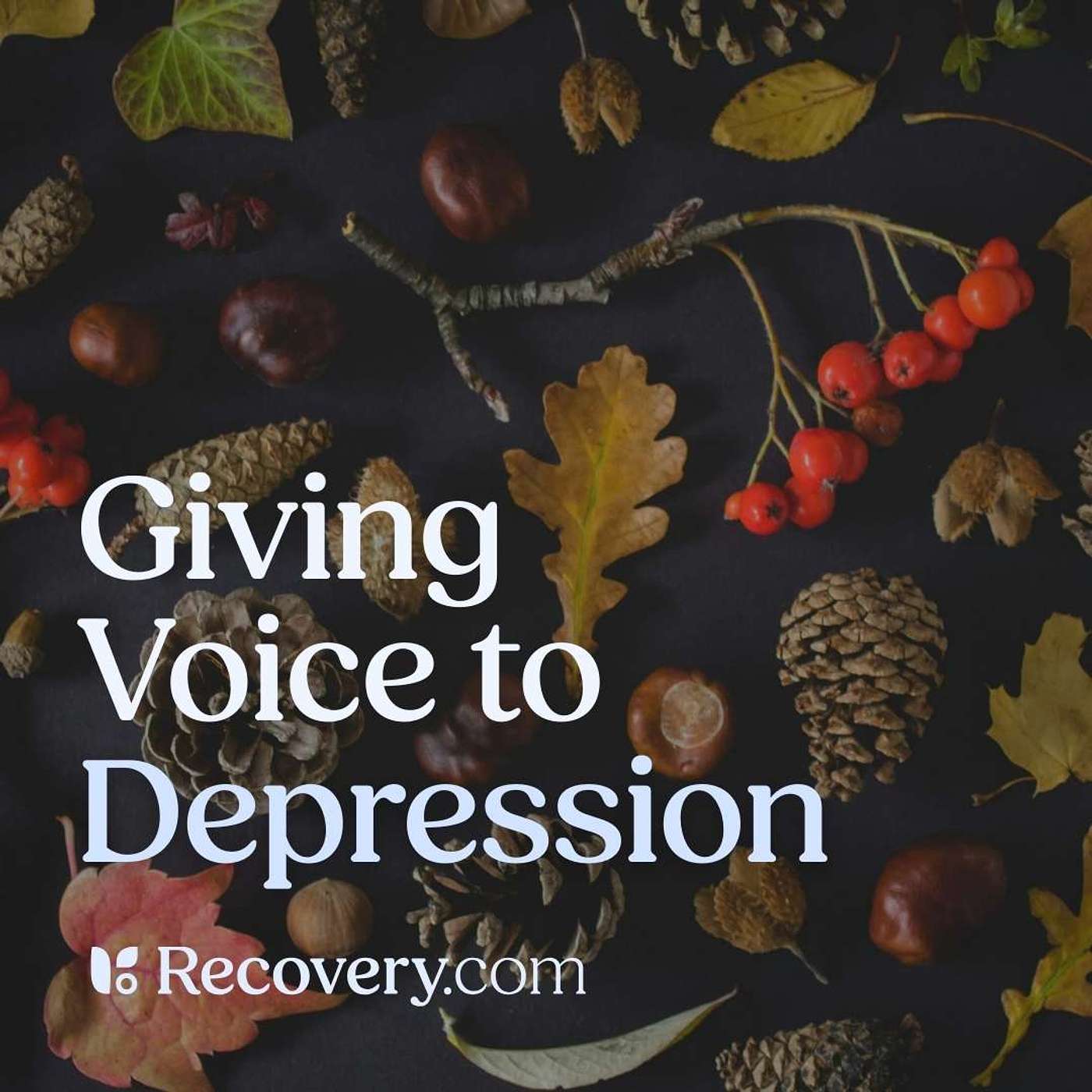Discover Giving Voice to Depression: Real Stories & Expert Support for Depression and Mental Health
Giving Voice to Depression: Real Stories & Expert Support for Depression and Mental Health

Giving Voice to Depression: Real Stories & Expert Support for Depression and Mental Health
Author: Recovery.com - Depression Help & Support
Subscribed: 1,345Played: 40,813Subscribe
Share
© 2025 Giving Voice to Depression: Real Stories & Expert Support for Depression and Mental Health
Description
Giving Voice To Depression unites lived experience and expert insight to shine a spotlight on depression and mental health. Each week, we bring you honest personal stories, evidence-based strategies, and compassionate conversations to help you understand, cope with, and recover from depression. Whether you’re navigating your own journey, supporting a loved one, or simply seeking to better understand mental-health challenges, this podcast offers real voices, trusted guidance, and a path toward hope. Subscribe now for new episodes every week and join a community where depression isn’t silenced—it’s voiced, understood and overcome.
485 Episodes
Reverse
The holiday season can bring warmth, connection, and joy — but it can also trigger deep stress, loneliness, and depression. In this insightful conversation, Dr. Anita Sanz, psychologist and board member for Giving Voice to Depression, joins hosts Terry McGuire and Bridget to talk about how to navigate the holidays with compassion and balance. Using a surprising lens — Ebenezer Scrooge — Dr. Sanz explores how grief, loss, and unrealistic expectations can transform the season into an emotional ...
In this special episode of Giving Voice to Depression, hosts Terry McGuire and her sister and former co-host Bridget Shore introduce a simple, science-backed tool that anyone can use to calm their nervous system and ease symptoms of depression or anxiety — EFT (Emotional Freedom Technique), also known as tapping. They’re joined by Brad Yates, one of the world’s most recognized EFT practitioners, who guides listeners through a powerful step-by-step tapping session designed specifically for peo...
The holidays are marketed as “the most wonderful time of the year,” but for millions struggling with depression, anxiety, and burnout, the season can feel more overwhelming than joyful. In this special Giving Voice to Depression episode, Terry McGuire and Dr. Anita Sanz discuss how to manage emotional overload and protect your mental health amid unrealistic expectations, family pressures, and financial strain. Dr. Sanz shares compassionate, evidence-based strategies she gives her therapy clie...
The holidays are often portrayed as a time of joy, connection, and celebration—but for many living with depression or grief, this season can feel unbearably heavy. In this episode of Giving Voice to Depression, host Terry McGuire and psychologist Dr. Anita Sanz speak with grief expert Krista St-Germain about how to navigate the emotional complexities of the holiday season when you’re struggling with loss, sadness, or mental exhaustion. Krista explains the difference between grief and depressi...
Michelle is a mom living with depression, anxiety, and ADHD — and raising children diagnosed with OCD, ADHD, and DMDD. In this candid and compassionate episode, she describes how she juggles emotional overwhelm, fights toxic productivity, and clings to small moments of self-care. You’ll hear real strategies from her therapy sessions, how she recognizes early signs of a crash, and why talking to yourself with kindness matters. If you’ve ever wondered how to keep parenting through your own dark...
In this deeply moving episode of Giving Voice to Depression, Cara from Belfast, Northern Ireland, opens up about her journey through years of darkness — from living with untreated depression as a teen to finally finding validation, healing, and light through therapy. Cara describes depression not as constant sadness but as a suffocating grayness — a loss of color, motivation, and meaning. After multiple suicide attempts and years of feeling numb, she reached a breaking point in 2021 and took ...
After years of living with depression — through countless ups, downs, and failed treatment attempts — Caryn finally found light again. In this episode of Giving Voice to Depression, she opens up for the first time about what it’s like to live with treatment-resistant depression, the exhaustion of constantly “trying,” and the unexpected relief that came when she finally found the right therapist and medication. Caryn describes how depression shows up not just mentally, but physically — the ach...
This episode of Giving Voice to Depression features licensed therapist Carolina Bracco and a candid conversation about the profound, long-term effects of growing up with emotionally immature or overly critical parents. Co-hosts Terry McGuire and Carly McCollow explore this often-overlooked area of childhood experience, highlighting how these parental patterns can contribute to depression and shape an adult's life, relationships, and even their own parenting style. Carolina, a chil...
Depression in older adults is one of the most under-discussed — and most misunderstood — mental health challenges today. In this moving episode of Giving Voice to Depression, 93-year-old Mary shares what it’s like to experience depression in later life — when most of her peers have passed away, her body feels unfamiliar, and her generation still believes that “you just don’t talk about those things.” Mary’s story challenges stereotypes about aging and mental health. She speaks candidly about ...
When someone you love is struggling with depression, anxiety, or addiction, knowing how to help can be agonizing — especially when every attempt seems to fail. In this episode of Giving Voice to Depression, licensed psychotherapist and professional interventionist Evan Jarschauer explains what real mental health interventions look like — far from the dramatic TV versions that oversimplify the process. Evan has spent over 20 years helping families and individuals break the cycle of resistance,...
When depression makes it hard to get out of bed, eat, or even believe things will ever get better, a loving pet can be a lifeline. In this moving episode of Giving Voice to Depression, Lori shares how her dogs helped her survive and heal after divorce and severe depression. Lori describes days spent “swimming through mud,” unable to function—until her dogs gave her a reason to get up, go outside, and reconnect with the world. Through their loyalty, routine, and affection, she found purpose an...
The grief that follows a suicide is unlike any other. It’s layered with guilt, confusion, trauma, and the persistent question: Why? In this powerful episode of Giving Voice to Depression, guest Lisa Sugarman shares her journey after losing her father, cousin, and close friend to suicide — and what she’s learned about navigating the unique and complex grief that follows. Lisa offers deeply personal reflections on the healing power of connection, the role of the 988 Suicide and Crisis Lifeline,...
After a suicide, words can either comfort and connect — or cut and cause more pain. In this powerful episode of Giving Voice to Depression, journalist and suicide loss survivor Deb Sherwood shares her personal experience navigating the unthinkable grief following her husband’s death by suicide — and the devastating impact of well-intentioned but hurtful comments from doctors, therapists, and friends. Deb speaks candidly about the importance of language, how certain phrases can retraumatize su...
Award-winning journalist and author Meg Kissinger joins Giving Voice to Depression to share the extraordinary and heartbreaking story behind her memoir “While You Were Out.” In her conversation with Terry McGuire and Carly McCollow, Meg opens up about growing up in a large family marked by bipolar disorder, schizophrenia, and depression—as well as two sibling deaths by suicide. She explores how decades of silence and stigma shaped her family’s story and how finally speaking out broke the cycl...
Award-winning journalist and author Meg Kissinger joins Giving Voice to Depression to share the extraordinary and heartbreaking story behind her memoir “While You Were Out.” In her conversation with Terry McGuire and Carly McCollow, Meg opens up about growing up in a large family marked by bipolar disorder, schizophrenia, and depression—as well as two sibling deaths by suicide. She explores how decades of silence and stigma shaped her family’s story and how finally speaking out broke the cycl...
In this deeply human episode of Giving Voice to Depression, John, a survivor of a suicide attempt, shares his ongoing struggle with self-forgiveness — and what healing looks like when you’re still learning to forgive yourself. While many conversations about suicide focus on grief or prevention, John opens up about what comes after survival: the guilt, shame, and lingering belief that he doesn’t deserve forgiveness. Despite being forgiven by his family, including his son, John continues to wre...
What happens when mental health and addiction collide? In this episode of Giving Voice to Depression, David Shamszad shares his raw and revealing story of living with bipolar disorder and alcohol addiction — a combination often referred to as a dual diagnosis. From self-medicating through college to hospitalization, reckless mania, and rock bottom, David opens up about how stigma, shame, and silence kept him from getting help for years. His turning point came after a dangerous blackout that c...
In this episode of Giving Voice to Depression, Dr. Barbara Moser, a trained teacher in mindful self-compassion, shares three simple yet powerful practices you can use anytime to cope with stress, anxiety, and depression. These tools are free, backed by credible research, and require no appointment, transportation, or side effects. From mindful breathing to the STOP method and a self-compassion break, these practices are designed to help you calm your nervous system, manage transitions, and re...
In this episode of Giving Voice to Depression, Kevin Lepine shares his deeply personal journey of growing up misunderstood, bullied, and isolated — experiences that fueled his depression long before he had words to describe it. He opens up about the pain of being unseen, living with undiagnosed ADD, and the crushing loneliness that often comes with both bullying and depression. Kevin also discusses the turning points that helped him: friends who refused to let him disappear, learning the lang...
In this episode of Giving Voice to Depression, we revisit the powerful story of author and advocate Rebecca Lombardo, who has openly shared her struggles with bipolar disorder, depression, and suicidality. Now 10 years removed from her last hospitalization and self-harm attempt, Rebecca reflects on her growth, resilience, and the coping strategies that have helped her heal. She discusses the importance of self-awareness, positive self-talk, and open communication with loved ones, as well as t...

























What I don't believe in, is lumping depression in with addiction recovery which sometimes people like to do. That somehow you can alter the Twelve Steps and make "Depression Anonymous." I am not an addict, nor have I ever been, whether its drugs, alcohol, sex, etc. The Twelve Steps were originally created specifically to address alcohol addiction. Having depression doesn't mean you're addicted to a substance. If you were, it's called dual diagnosis.
I really identified with this guest. It was like listening to myself talk I have the same issue.
He makes such a good point in reminding us to be KIND to ourselves. Depression sometimes makes us say the most horrible things to ourselves. And they SEEM so real at the time. But they'rere lies. Thank you for doing this podcast.
it was wrong .we have at least almost 50 melion depressed people in my country
Can I have the link of his blog
I've experienced what you felt, but it's like you know, unstable emotions that I just couldn't control anymore. there are times when I just wanna ended up my life, but then I remembered about my family. It just that I was kind of my Family connector and I couldn't imagine how my family would be If i'm gone:(
yess
These were amazing conversation starters. I'm planning to reframe them to use them to let my loved one know I'm here as a non stressful support system when they're ready to share and plan. thank you for this great resource.